19 july 2015

The Israeli occupation forces (IOF) on Saturday afternoon opened machinegun fire at Palestinian farmers east of the Gaza Strip, with no reported casualties.
Local sources told Quds Press that Israeli border troops posted near the security fence opened fire intensively at Palestinian farmers and their homes to the east of al-Maghazi refugee camp in central Gaza.
They added that several drones were seen overflying the area while there were unusual military movements along the eastern border with Gaza.
Local sources told Quds Press that Israeli border troops posted near the security fence opened fire intensively at Palestinian farmers and their homes to the east of al-Maghazi refugee camp in central Gaza.
They added that several drones were seen overflying the area while there were unusual military movements along the eastern border with Gaza.
18 july 2015
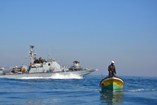
The Israeli occupation navy early Sunday morning opened heavy machinegun fire on Palestinian fishing boats despite sailing within the unilaterally designated fishing zone.
Local sources said an Israeli warship attacked Palestinian fishing vessels sailing in northern Gaza sea, forcing the fishermen to leave for fear of being killed.
The attack is another chain in the series of Israeli infringements of the Cairo-brokered ceasefire accord signed on August 26.
Local sources said an Israeli warship attacked Palestinian fishing vessels sailing in northern Gaza sea, forcing the fishermen to leave for fear of being killed.
The attack is another chain in the series of Israeli infringements of the Cairo-brokered ceasefire accord signed on August 26.
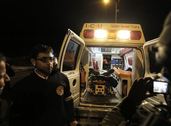
Palestinian medical sources have reported that a child was shot, and injured, by Israeli army fire in Abasan al-Kobra town, in the southern Gaza Strip district of Khan Younis.
The sources said Mansour Abu T’eima, 14 years of age, suffered a gunshot injury in his left leg.
He was moved to the Gaza European Hospital, suffering a moderate but stable injury.
The child was playing in an area close to the border fence when the soldiers opened fire on him and his friends.
The soldiers frequently target Palestinians, including farmers and workers, in lands close to the “Security Fence,” across the border with the coastal region.
The sources said Mansour Abu T’eima, 14 years of age, suffered a gunshot injury in his left leg.
He was moved to the Gaza European Hospital, suffering a moderate but stable injury.
The child was playing in an area close to the border fence when the soldiers opened fire on him and his friends.
The soldiers frequently target Palestinians, including farmers and workers, in lands close to the “Security Fence,” across the border with the coastal region.
16 july 2015
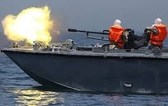
A group of Palestinian fisherman on Wednesday morning came under machinegun fire from the Israeli occupation navy off the coast of the besieged Gaza Strip.
Local sources said that Israeli gunboats opened fire at some fishermen working within the permitted fishing zone off the northern shore of Gaza.
They added the intensity of the gunfire forced the fishermen to return ashore, without stating if anyone suffered injuries in the attack.
Local sources said that Israeli gunboats opened fire at some fishermen working within the permitted fishing zone off the northern shore of Gaza.
They added the intensity of the gunfire forced the fishermen to return ashore, without stating if anyone suffered injuries in the attack.
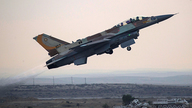
The Israeli Air Force carried out, on
Thursday at dawn, two air strikes targeting sites in the northern and
central parts of the Gaza Strip; the army claims it was responding to a
rocket fired into an area in the Hof Ashkelon Regional Council.
Palestinian sources said the army fired two missiles into the Civil Administration Office, in Jabalia town, in the northern part of the Gaza Strip, causing damage but no casualties.
The army also fired missiles into a site, used by an armed resistance group, in the al-Boreij refugee camp, in central Gaza, causing damage but no casualties.
Israel said the airstrikes came in retaliation to a shell that was allegedly fired from Gaza into the Hof Ashkelon Regional Council, approximately at 2 after midnight.
Israeli Ynet News said the Red Alert sirens were sounded in the Zikim area, certain parts of Ashkelon and the Hof Ashkelon Regional Council, causing no damage or injuries.
It added that the Israeli army held the Hamas movement in Gaza responsible for the attack.
IAF strikes Gaza after rocket fire on Israel
Infrastructure bombed in Gaza close to dawn; code red sirens sound in southern Israel as rocket hits open area; no damage or injuries reported after rocket strike.
The Israeli Air Force attacked an infrastructure target in Gaza early Thursday morning in response to a rocket that was fired from the Palestinian enclave just after 2am local time.
A passerby was lightly hurt in the Gaza Strip, according to residents while none of the organizations known to hold rocket stockpiles in Gaza initially claimed responsibility for the early morning rocket attack on Israel.
The rocket set off code red sirens in Zikim, parts of Ashkelon city and the Hof Ashkelon Regional Council, earning a response from an IDF spokesperson who said Israel holds Hamas responsible for such incidents.
No damage or injuries were reported as a result of the Gazan missile that landed in an open area in the Hof Ashkelon Regional Council. Security forces are still searching the area to find the projectile.
"The IDF considers this incident a severe one," said the IDF spokesperson in announcing the retaliatory attack on Gaza. We won't put up with any attempt to harm Israeli civilians. Hamas is the address of responsibility."
Rocket fire on southern Israel has been on the rise over the past several weeks, including an incident in which ISIS affiliated militants in the Sinai Peninsula fired on Israel.
Israeli air strike hits blockaded Gaza Strip
The Israeli occupation warplanes struck targets in the blockaded Gaza Strip early on Thursday morning
on allegations that a rocket from the coastal territory landed in southern Israel.
Eye-witnesses said the first air strike targeted a resistance site in northern Gaza with spates of rocket fire and another site east of al-Bureij refugee camp, in central Gaza.
No injuries were reported in the raids.
Israeli media outlets claimed the strikes were launched in response to a rocket that struck an open ground near the city of Ashkelon before dawn with no reported damage.
The air strikes are another of Israel’s ongoing violation of the Cairo-brokered ceasefire accord signed with Palestinian resistance factions on August 26.
Activists have accounted for hundreds of Israeli violations in the past 10 months which included limited incursions into Gaza, shootings at farmers and fishermen. Several were injured and a couple murdered.
Palestinian sources said the army fired two missiles into the Civil Administration Office, in Jabalia town, in the northern part of the Gaza Strip, causing damage but no casualties.
The army also fired missiles into a site, used by an armed resistance group, in the al-Boreij refugee camp, in central Gaza, causing damage but no casualties.
Israel said the airstrikes came in retaliation to a shell that was allegedly fired from Gaza into the Hof Ashkelon Regional Council, approximately at 2 after midnight.
Israeli Ynet News said the Red Alert sirens were sounded in the Zikim area, certain parts of Ashkelon and the Hof Ashkelon Regional Council, causing no damage or injuries.
It added that the Israeli army held the Hamas movement in Gaza responsible for the attack.
IAF strikes Gaza after rocket fire on Israel
Infrastructure bombed in Gaza close to dawn; code red sirens sound in southern Israel as rocket hits open area; no damage or injuries reported after rocket strike.
The Israeli Air Force attacked an infrastructure target in Gaza early Thursday morning in response to a rocket that was fired from the Palestinian enclave just after 2am local time.
A passerby was lightly hurt in the Gaza Strip, according to residents while none of the organizations known to hold rocket stockpiles in Gaza initially claimed responsibility for the early morning rocket attack on Israel.
The rocket set off code red sirens in Zikim, parts of Ashkelon city and the Hof Ashkelon Regional Council, earning a response from an IDF spokesperson who said Israel holds Hamas responsible for such incidents.
No damage or injuries were reported as a result of the Gazan missile that landed in an open area in the Hof Ashkelon Regional Council. Security forces are still searching the area to find the projectile.
"The IDF considers this incident a severe one," said the IDF spokesperson in announcing the retaliatory attack on Gaza. We won't put up with any attempt to harm Israeli civilians. Hamas is the address of responsibility."
Rocket fire on southern Israel has been on the rise over the past several weeks, including an incident in which ISIS affiliated militants in the Sinai Peninsula fired on Israel.
Israeli air strike hits blockaded Gaza Strip
The Israeli occupation warplanes struck targets in the blockaded Gaza Strip early on Thursday morning
on allegations that a rocket from the coastal territory landed in southern Israel.
Eye-witnesses said the first air strike targeted a resistance site in northern Gaza with spates of rocket fire and another site east of al-Bureij refugee camp, in central Gaza.
No injuries were reported in the raids.
Israeli media outlets claimed the strikes were launched in response to a rocket that struck an open ground near the city of Ashkelon before dawn with no reported damage.
The air strikes are another of Israel’s ongoing violation of the Cairo-brokered ceasefire accord signed with Palestinian resistance factions on August 26.
Activists have accounted for hundreds of Israeli violations in the past 10 months which included limited incursions into Gaza, shootings at farmers and fishermen. Several were injured and a couple murdered.
|
|
During the 51-day Israeli offensive on the Gaza Strip, which took place between 7 July and 26 August last year, a group of Palestinian children fled to the beach to escape from the harsh and extensive bombing of houses, hospitals, healthcare centres and playgrounds; they went there to play football.
They thought that the beach, an open area, was a safe place because it has never been used by the Palestinian resistance. Although the seven of them arrived on the beach safely, minutes later, four had been killed and three were wounded after being targeted by shells apparently fired from an Israeli warship. "That day, 16 July, a number of Israeli F16 rockets hit our neighbourhood," explained Sayid Baker, 13, one of the children on the beach. "My brother, my cousins and I fled and decided to go to the beach instead of going back home." Sayid's father, Ramiz Baker, 45, was busy that day with his neighbours, whose houses were targeted and whose relatives and loved ones were killed or wounded. He thought that his children were safe because he knew that they were playing football on the beach. "I was surprised when I heard the news that Israeli strikes had targeted the Gaza beach," he said. "I collapsed immediately as I remembered my sons were playing there; I remained conscious, though, then I stood up and rushed to the beach with my brother and two cousins." In the car, Ramiz listened to local radio stations, and knew that a group of children from the Baker family were targeted and a number of them were killed and others were wounded. |
"I stopped the car and asked one of my cousins to take the wheel and head for Al-Shifa Hospital. I knew that by then the casualties must have arrived at the hospital, either dead or alive."
What he saw at the hospital was a "catastrophe," he recalled. "I found dozens of my relatives and saw the corpses of four children lying down at the door of the morgue. That was a real shock."
Although Sayid was wounded - and that made his father "go crazy and sad" - at least, Ramiz told me, he recovered a couple of months later. In fact, the only problem that Sayid still has, according to his father, is going down to the beach, which is on the doorstep of his house.
"The most difficult problem for me," said Ramiz, "is that my son Muntaser has been silent since the day of the massacre." He believes that if Muntaser had lost one of his limbs, like many other wounded children, it might have been easier for him rather than the psychological trauma he has been living with since that day.
According to a UNICEF bulletin on events last summer, "Civilians, particularly Palestinian children, have borne the brunt of the hostilities in Gaza, the third major military confrontation between Israel and Gaza in six years."
During those two months, which included the 51-day offensive, the Israelis killed 2,260 Palestinians, including 551 children, and wounded more than 11,000 others, among whom were 3,370 children. The World Health Organisation estimates that 1,000 of the children who were wounded will suffer from a lifelong disability.
In the wake of the offensive, UNICEF said that at least 373,000 children required direct and specialised psychosocial support. The UN organisation believes that up to 1,500 children were orphaned. The right of Gaza's children to an education was also affected severely, with at least 258 schools damaged by the Israeli assault.
After psychological support, Sayid could speak easily, but is still unable to go back to school. His brother Muntaser still cannot speak.
Child psychiatrist Sami Eweeda, who is part of Gaza Community Mental Health Programme, said that it is very difficult to end the negative psychological repercussions of the Israeli offensives on the Palestinian children in Gaza. "The most demanded value in Gaza is to feel safe," he said. "This is not possible because it is connected to political will and decisions." As long as there are no guarantees that this kind of aggression against Palestinians is going to stop, the psychological suffering of the Palestinians in Gaza will continue, he added. "There is no real meaning to any treatment without the existence of such guarantees."
Before leaving Sayid, his father and his silent brother, the teenager told me, "If there were no wars I would not have lost my brothers and cousins and would have been playing football at the beach again and again and again." It remains his hope to be able to do so once more.
What he saw at the hospital was a "catastrophe," he recalled. "I found dozens of my relatives and saw the corpses of four children lying down at the door of the morgue. That was a real shock."
Although Sayid was wounded - and that made his father "go crazy and sad" - at least, Ramiz told me, he recovered a couple of months later. In fact, the only problem that Sayid still has, according to his father, is going down to the beach, which is on the doorstep of his house.
"The most difficult problem for me," said Ramiz, "is that my son Muntaser has been silent since the day of the massacre." He believes that if Muntaser had lost one of his limbs, like many other wounded children, it might have been easier for him rather than the psychological trauma he has been living with since that day.
According to a UNICEF bulletin on events last summer, "Civilians, particularly Palestinian children, have borne the brunt of the hostilities in Gaza, the third major military confrontation between Israel and Gaza in six years."
During those two months, which included the 51-day offensive, the Israelis killed 2,260 Palestinians, including 551 children, and wounded more than 11,000 others, among whom were 3,370 children. The World Health Organisation estimates that 1,000 of the children who were wounded will suffer from a lifelong disability.
In the wake of the offensive, UNICEF said that at least 373,000 children required direct and specialised psychosocial support. The UN organisation believes that up to 1,500 children were orphaned. The right of Gaza's children to an education was also affected severely, with at least 258 schools damaged by the Israeli assault.
After psychological support, Sayid could speak easily, but is still unable to go back to school. His brother Muntaser still cannot speak.
Child psychiatrist Sami Eweeda, who is part of Gaza Community Mental Health Programme, said that it is very difficult to end the negative psychological repercussions of the Israeli offensives on the Palestinian children in Gaza. "The most demanded value in Gaza is to feel safe," he said. "This is not possible because it is connected to political will and decisions." As long as there are no guarantees that this kind of aggression against Palestinians is going to stop, the psychological suffering of the Palestinians in Gaza will continue, he added. "There is no real meaning to any treatment without the existence of such guarantees."
Before leaving Sayid, his father and his silent brother, the teenager told me, "If there were no wars I would not have lost my brothers and cousins and would have been playing football at the beach again and again and again." It remains his hope to be able to do so once more.
14 july 2015
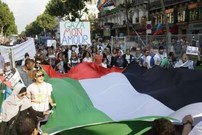
A rally was staged by CODEPINK and Jewish Voice for Peace organizations in protest at Israel’s violation of Palestinians’ rights and aggression on Gaza.
The rally-goers protested outside of the Christians United for Israel (CUFI) National Summit.
For far too long, CUFI had influenced American foreign policy to support Israel’s extreme violations of Palestinian human rights.
The protesters lifted Palestinian flags and banners reading “Free Palestine”; “End the occupation of Palestine” and “Netanyahu is a war criminal.”
The demonstrators paid tribute to the souls of the Palestinian civilians who were murdered in last summer’s Israeli offensive on the blockaded Gaza Strip.
Spokesperson for the rally slammed the Israeli occupation for committing horrendous crimes against the Palestinian people, particularly, but not exclusively, in besieged Gaza.
The rally-goers protested outside of the Christians United for Israel (CUFI) National Summit.
For far too long, CUFI had influenced American foreign policy to support Israel’s extreme violations of Palestinian human rights.
The protesters lifted Palestinian flags and banners reading “Free Palestine”; “End the occupation of Palestine” and “Netanyahu is a war criminal.”
The demonstrators paid tribute to the souls of the Palestinian civilians who were murdered in last summer’s Israeli offensive on the blockaded Gaza Strip.
Spokesperson for the rally slammed the Israeli occupation for committing horrendous crimes against the Palestinian people, particularly, but not exclusively, in besieged Gaza.
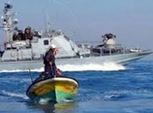
Israeli navy ships attacked, on Tuesday morning, several fishing boats in Palestinian waters near Gaza city, while Israeli soldiers opened fire on farmlands and homes, in central Gaza.
The navy fired dozens of rounds of live ammunition on fishing boats in the Sudaniyya Sea, northwest of Gaza city, causing damage to at least one boat.
The fishers had to sail to shore fearing additional Israeli fire, no injuries were reported.
In related news, soldiers stationed across the border fence, opened fire on Palestinian farmers in their own lands, east of the al-Boreij refugee camp, in central Gaza.
The soldiers also targeted a number of nearby homes, causing damage but no injuries.
The navy fired dozens of rounds of live ammunition on fishing boats in the Sudaniyya Sea, northwest of Gaza city, causing damage to at least one boat.
The fishers had to sail to shore fearing additional Israeli fire, no injuries were reported.
In related news, soldiers stationed across the border fence, opened fire on Palestinian farmers in their own lands, east of the al-Boreij refugee camp, in central Gaza.
The soldiers also targeted a number of nearby homes, causing damage but no injuries.
13 july 2015
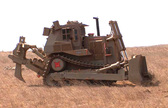
Israeli soldiers opened fire, earlier on Monday morning, on a number of Palestinian farmers, working in their lands east of Khan Younis, in the southern part of the Gaza Strip; the army also fired at nearby homes, while military bulldozers placed sand barriers.
The Palestinian News & Info Agency (WAFA) has reported that soldiers, stationed on military towers across the border fence, east of Khan Younis, fired several of rounds of live ammunition at the Palestinian farmers, forcing them to leave their lands.
The soldiers also targeted a few nearby homes, and property, causing damage but no injuries.
In addition, Israeli military bulldozers placed sand barriers near the border fence, east of Khan Younis, while several armored vehicles were deployed across the border fence.
The Palestinian News & Info Agency (WAFA) has reported that soldiers, stationed on military towers across the border fence, east of Khan Younis, fired several of rounds of live ammunition at the Palestinian farmers, forcing them to leave their lands.
The soldiers also targeted a few nearby homes, and property, causing damage but no injuries.
In addition, Israeli military bulldozers placed sand barriers near the border fence, east of Khan Younis, while several armored vehicles were deployed across the border fence.
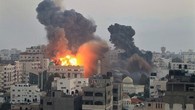
After Israel's gigantic fiasco in al-Asf al-Maakoul battle in summer 2014, it started to target the Palestinian civilians as a retaliatory measure in response to Hamas's victories. The subsequent Israeli shelling of residential areas led to the displacement of hundreds of Palestinian families.
Israel's last war on Gaza claimed the lives of 2,310 Palestinians, rendered 10,626 wounded most of them children, women, and unarmed civilians, and destroyed 13,217 homes.
However, Hamas, in particular and the Palestinian resistance in general, managed to hold its ground in face of the Israeli occupation army's invasion that lasted for 51 days.
Israel could not find a way to pressure Hamas other than targeting innocent civilians and demolish the homes over the heads of their inhabitants.
Al-Dhafer, an 11-story apartment tower, the Italian complex, and other residential towers were reduced to rubble during the last Israeli aggression on Gaza.
The political analyst Prof. Abdul Sattar Qassem affirmed that Israel pursues this criminal policy whenever it fails to score military achievements, and clarified that this policy was adopted in Vietnam, Iraq, Afghanistan, and South Lebanon wars.
"When the aggressor fails to win a battle against its enemy, it targets the civilians so as the latter would pressure their political and military leaders to stop the war. During the last war on Gaza Israel vainly attempted to incite the public against Hamas," Qassem said.
The Palestinian security expert Mahmoud al-Ajrami said that Israel was trying to get out of its awkward position by targeting the residential towers, and added that Israel miserably failed in inciting the Gazan people against the resistance.
In an interview with the German newspaper Die Zeit, the Israeli air-force commander Amir Eshel warned Hezbollah and Hamas that Israel would not hesitate to attack any residential towers in Gaza or Lebanon, meaning that Israel intends to target the civilians in absolute disregard to the international norms and laws.
For his part, Ashkelon Regional Council Chairman Yair Farjon urged the Israeli army a few days ago to shell the major residential towers in Gaza to deter rocket fire from the Gaza Strip.
Israel's last war on Gaza claimed the lives of 2,310 Palestinians, rendered 10,626 wounded most of them children, women, and unarmed civilians, and destroyed 13,217 homes.
However, Hamas, in particular and the Palestinian resistance in general, managed to hold its ground in face of the Israeli occupation army's invasion that lasted for 51 days.
Israel could not find a way to pressure Hamas other than targeting innocent civilians and demolish the homes over the heads of their inhabitants.
Al-Dhafer, an 11-story apartment tower, the Italian complex, and other residential towers were reduced to rubble during the last Israeli aggression on Gaza.
The political analyst Prof. Abdul Sattar Qassem affirmed that Israel pursues this criminal policy whenever it fails to score military achievements, and clarified that this policy was adopted in Vietnam, Iraq, Afghanistan, and South Lebanon wars.
"When the aggressor fails to win a battle against its enemy, it targets the civilians so as the latter would pressure their political and military leaders to stop the war. During the last war on Gaza Israel vainly attempted to incite the public against Hamas," Qassem said.
The Palestinian security expert Mahmoud al-Ajrami said that Israel was trying to get out of its awkward position by targeting the residential towers, and added that Israel miserably failed in inciting the Gazan people against the resistance.
In an interview with the German newspaper Die Zeit, the Israeli air-force commander Amir Eshel warned Hezbollah and Hamas that Israel would not hesitate to attack any residential towers in Gaza or Lebanon, meaning that Israel intends to target the civilians in absolute disregard to the international norms and laws.
For his part, Ashkelon Regional Council Chairman Yair Farjon urged the Israeli army a few days ago to shell the major residential towers in Gaza to deter rocket fire from the Gaza Strip.
12 july 2015
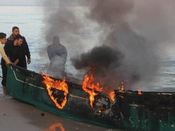
Israeli navy ships opened fire, on Sunday morning, on a number of Palestinian fishing boats, near the Gaza shore, forcing them back to land.
Eyewitnesses said the navy fired rounds of live ammunition, near the Sudaniyya shore, northwest of Gaza City, causing damage but no injuries.
Two days ago, the navy kidnapped six fishers in the Sudaniyya sea, took them to Ashdod, and confiscating their boats.
The navy frequently targets Gaza fishers, and their boats, in direct violations of every ceasefire agreement, and the Oslo accords.
Eyewitnesses said the navy fired rounds of live ammunition, near the Sudaniyya shore, northwest of Gaza City, causing damage but no injuries.
Two days ago, the navy kidnapped six fishers in the Sudaniyya sea, took them to Ashdod, and confiscating their boats.
The navy frequently targets Gaza fishers, and their boats, in direct violations of every ceasefire agreement, and the Oslo accords.
|
|

One year after a devastating war, Première Urgence – Aide Médicale International (PU-AMI) urged the international community to address the continuing disastrous situation affecting the Gaza strip especially in the Access Restricted Area (ARA) where Israel continues enforcing strict access restrictions on both land and sea.
The ARA covers about 17% of Gaza’s total land and 35% of Gaza’s arable land hence hindering dramatically Gaza’s farming capacity. Farmers from the area, already deeply affected by the war, face difficulties and risks to access their lands impacting further their capacity to make a living in a place where unemployment rises up to 44% (World Bank report, 22 May 2015). Incursions and incidents are still going on: Ganso records 400 incidents of Israeli border fire into Gaza – an average of more than one a day. The blockade which has been in place for 8 years now deepens the humanitarian crisis by preventing essential goods and also construction material to enter the Gaza strip where about 17 600 families are still considered as displaced from their homes. To face the situation, PU-AMI provided emergency support during and following the war to the most affected families in the middle and the south of the Gaza strip (Additional information in annex). One year after the start of the 51 days war, urgent attention needs to be given to Gaza in order to speed up the reconstruction process which is the only way to ensure a safe and viable future to its inhabitants. Video |
Truce violations List of names Pictures of martyrs
Days: Aug: 26 - 25 - 24 - 23 - 22 - 21 - 20 - 19 - 18 - 17 - 16 - 15 - 14 - 13 - 12 - 11 - 10 - 9 - 8 - 7 - 6 - 5 - 4 - 3 - 2 - 1
July: 31 - 30 - 29 - 28 - 27 - 26 - 25 - 24 - 23 - 22 - 21 - 20 - 19 - 18 - 17 - 16 - 15 - 14 - 13 - 12 - 11 - 10 - 9 - 8
